Nothing can quite prepare you for your first time scuba diving, but we'll try our best. From ensuring you're fighting fit and scrubbing up on your front crawl to practicing your breathing and having a good night's sleep, there's plenty to consider before you dip your toe (fin) into the water. And, of course, choosing the perfect destination is key. Feeling up to the challenge? Read on for our beginner scuba diving top tips...
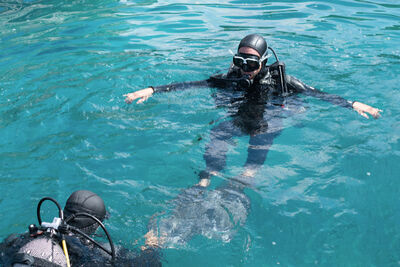
1. Ensure you’re dive ready
Check your health and fitness before you take the plunge. As tranquil as diving feels, it's also physically demanding. From swimming against currents to carrying heavy equipment, your first time scuba diving (and every dive after) requires strength and stamina. Before beginning your scuba diving course, you'll be asked to complete a medical form to flag any conditions that could affect you underwater. Don't worry, these aren't necessarily deal-breakers. Some medical conditions may just require a doctor's note before your dive. But remember, your health comes first.
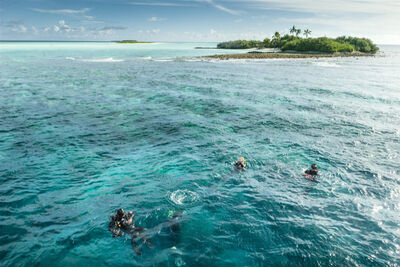
2. Feel comfortable in the water
Comfort is key for your first time scuba diving. You don't need to be the strongest swimmer, but your open water course will include two swim tests. First, you'll complete a 200m swim (or 300m if you're using a mask, snorkel and fins). Pick your favourite stroke and take it at your own pace - there's no time limit. Next, you'll need to show you can stay afloat by treading water for ten minutes. Once you've ticked both off and feel at ease in the water, you're ready to make a splash.
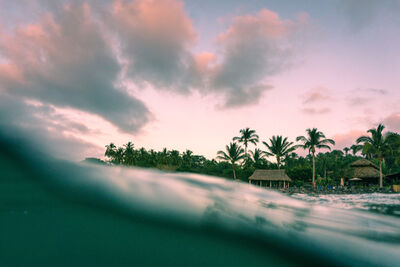
3. Choose the right course
There are two common routes into beginner scuba diving: the Open Water Diver certification or the Discover Scuba Diving experience. The open water course qualifies you to dive anywhere in the world with a dive buddy, up to depths of 18m for adults or 12m for children (aged ten to 14). The theory can often be done online before your holiday. Then, it's onto confined water training and four open water dives with your instructor. Nail those and you're certified.
Keen to test the waters first? Discover Scuba Diving is a great alternative. This short, introductory program will teach you the basics of scuba diving, without certifying you. You'll be briefed on underwater communication and diving safety, practice some essential scuba skills and then enjoy an optional open water dive (up to 12m).
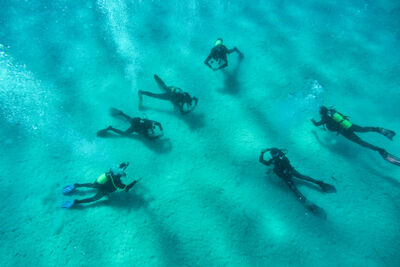
4. Breathe deeply
Next up, master the art of breathing. It sounds simple, but breathing underwater is a different experience from breathing on land. At first, it might feel unnatural and will take some time to adjust, but focusing on your breathing is key to a smooth diving experience. Inhale and exhale deeply, continuously and most importantly, don't hold your breath. A slow and steady breathing pattern helps you achieve good buoyancy control so that you can move effortlessly through the water with less exertion and better gas consumption.
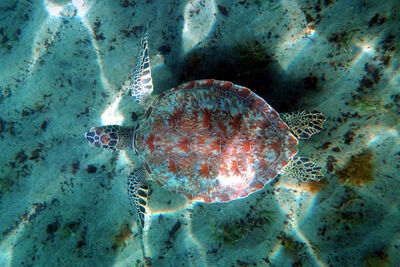
5. Rest and relax
A good night's sleep and a calm approach can make all the difference. Your first time scuba diving will require plenty of mental and physical energy, so make sure you're well rested (and maybe skip the margaritas the night before). Beginner nerves are normal, especially when learning an entirely new set of skills, so be patient with yourself. Rachel, our in-house dive instructor, emphasises the importance of staying calm: 'From years of working as an instructor, the second most important thing you can do after breathing deeply is relax. You're far more capable of manoeuvring yourself underwater and responding to challenges when calm and level-headed,' she says.

6. Pick your destination
Choosing your destination is crucial when it comes to beginner scuba diving. Malta and Gozo are excellent options if you don't want to travel too far from home. Enjoy shore access in Malta and calm shallow waters in Gozo, where reefs, wrecks and myriad marine life await. Or learn to dive in Grenada for easy access to shallow dive sites and underwater sculpture parks: Molinere Underwater Sculpture Park, we're looking at you.
If you're after warm waters and clear visibility, opt for the atolls and lagoons of the Maldives, where sharks, eagle rays and turtles will likely keep you company. Or head to Egypt and learn to dive in the Red Sea, surrounded by vibrant corals and flitting fish.
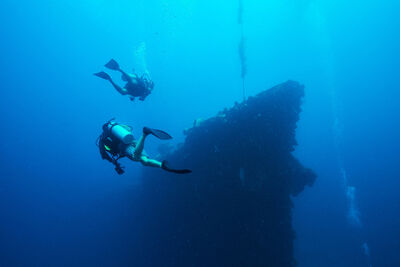
7. Have fun
Last but by no means least, remember to have fun. Your first time scuba diving will likely bring a mix of emotions from nerves to excitement, but the whole point is to enjoy yourself. With over 71% of the Earth's surface covered by water, your first dive is just the beginning.
















